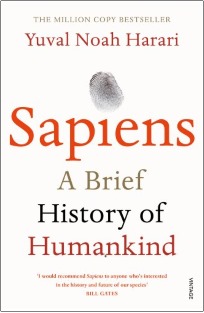

Writing four years after its English-language publication, Alex Preston wrote in The Guardian that Sapiens had become a "publishing phenomenon" with "wild success" symptomatic of a broader trend toward "intelligent, challenging nonfiction, often books that are several years old". It also made The New York Times best-seller list and won the National Library of China's Wenjin Book Award for the best book published in 2014. On Goodreads, the book is rated 4.4 out of 5 according to more than 600,000 reviews. Reception Popular reception įirst published in Hebrew in 2011 and then in English in 2014, the book has been translated into over 60 languages (as of September 2020). Harari cites Jared Diamond's Guns, Germs, and Steel (1997) as one of the greatest inspirations for the book by showing that it was possible to "ask very big questions and answer them scientifically". Humans have, in Harari's chosen metaphor, become gods: they can create species. He concludes by considering how modern technology may soon end the species as we know it, as it ushers in genetic engineering, immortality, and non-organic life. Harari also emphasises the lack of research into the history of happiness, positing that people today are not significantly happier than in past eras.
#Yuval noah harari criticism driver
He sees this as one driver of early modern European imperialism and of the current convergence of human cultures. Harari sees the Scientific Revolution as founded on innovation in European thought, whereby elites became willing to admit to, and hence to try to remedy, their ignorance.

#Yuval noah harari criticism drivers
Harari argues that money, empires, and universal religions are the principal drivers of this process. For centuries, the majority of humans lived in empires, and capitalist globalization is effectively producing one, global empire. In discussing the unification of humankind, Harari argues that over its history, the trend for Sapiens has increasingly been towards political and economic interdependence. Humans' violent treatment of other animals is a theme that runs throughout the book. Harari's key claim regarding the Agricultural Revolution is that while it promoted population growth for Sapiens and co-evolving species like wheat and cows, it made the lives of most individuals (and animals) worse than they had been when Sapiens were mostly hunter-gatherers, since their diet and daily lives became significantly less varied. Accordingly, Harari regards money as a system of mutual trust and sees political and economic systems as more or less identical with religions. Harari claims that all large-scale human cooperation systems – including religions, political structures, trade networks, and legal institutions – owe their emergence to Sapiens' distinctive cognitive capacity for fiction. He argues that these beliefs give rise to discrimination – whether that be racial, sexual or political and it is potentially impossible to have a completely unbiased society. He further argues that the ability of Sapiens to cooperate in large numbers arises from its unique capacity to believe in things existing purely in the imagination, such as gods, nations, money, and human rights. He argues that prehistoric Sapiens were a key cause of the extinction of other human species such as the Neanderthals, along with numerous other megafauna. Harari's main argument is that Sapiens came to dominate the world because it is the only animal that can cooperate flexibly in large numbers. Yet the situation of other animals is deteriorating more rapidly than ever before, and the improvement in the lot of humanity is too recent and fragile to be certain of. In the last few decades we have at least made some real progress as far as the human condition is concerned, with the reduction of famine, plague and war. But did we decrease the amount of suffering in the world? Time and again, massive increases in human power did not necessarily improve the well-being of individual Sapiens, and usually caused immense misery to other animals. We have mastered our surroundings, increased food production, built cities, established empires and created far-flung trade networks.

1543 CE, the emergence of objective science). 34 CE, the gradual consolidation of human political organisations towards one global empire). 10,000 BCE, the development of agriculture). 70,000 BCE, when Sapiens evolved imagination). He divides the history of Sapiens into four major parts: Harari surveys the history of humankind in the Stone Age up to the twenty-first century, focusing on Homo sapiens. The academic discipline of history is the account of cultural change. Harari's work situates its account of human history within a framework: he sees the natural sciences as setting the limits of possibility for human activity and sees the social sciences as shaping what happens within those bounds.


 0 kommentar(er)
0 kommentar(er)
